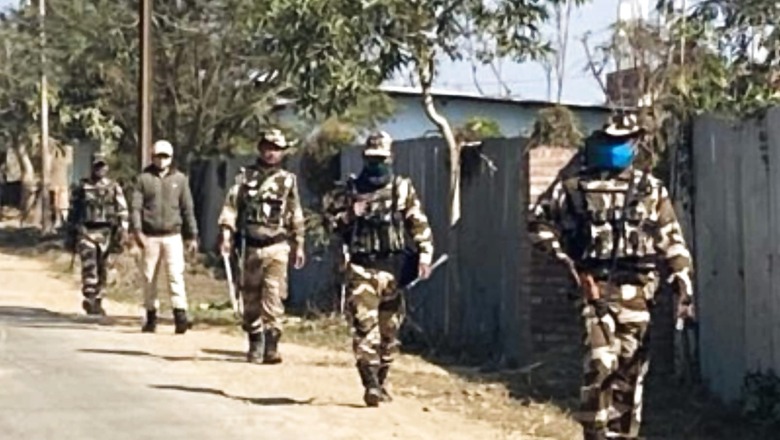
views
Announcement to exclude some areas in Assam, Nagaland and Manipur from the ambit of the Armed Forces (Special Powers) Act or AFSPA was welcomed by the citizens and chief ministers of all the three states. This announcement is the outcome of actions taken by the central and the state governments post the death of 13 civilians on December 4, 2021, who were ambushed in a case of mistaken identity by the Special Forces operating in Nagaland. The Ministry of Home Affairs had committed on December 26, 2021 that the government would take appropriate corrective action.
AFSPA was enacted in 1958 to meet the challenges of rapidly deteriorating law and order situation and rising insurgencies in India. Tribal affiliations and misconceived aspirations often became the reason to start secessionist insurgent movements. As things improved, many groups demanded separate states within the Union of India. Some demands for separate states were accepted and new states were carved out from the erstwhile state of Assam.
Changing geopolitical situation in the subcontinent gave rise to insurgencies even in peaceful and progressive states like Punjab, which forced the governments to retain such tough legislation, often called ‘draconian’ by human rights activists. No self-respecting citizen would like to live in an environment with round-the-clock presence of Army and police who have powers to stop and search individuals, vehicles and even their houses based on mere suspicion.
ALSO READ | Northeast Security Expert Explains AFSPA, Its Phased Withdrawal, Next 5 Steps for Govt
Lessons from the Past
To understand the implications of removal of AFSPA, it is important to comprehend where has AFSPA been enforced. In the past, this Act has been promulgated in the border states of the country because external support to the insurgency in these areas has the potential to make the threat very serious in a short time, impacting the entire country. National security often demands acts which are against the liberties of citizens in a democracy. However, governments owe it to the citizens to ensure that there is an in-built redressal mechanism which prevents misuse as well as ensures dignity of the citizens.
The announcement on Thursday entails AFSPA being lifted from 15 police stations (in seven districts) of Nagaland while it would remain effective in 57 police stations (in 13 districts). It needs to be noted that AFSPA continues to be effective in Mon district where the ambush had mistakenly killed 13 civilians last December. This clearly highlights that the decision on the areas from where it has been revoked is based on internal security assessment by the agencies concerned.
Keeping in view the dramatically improved internal security situation in Assam, the authorities have completely withdrawn the Act from 23 districts and partially in another district, it will remain effective in nine districts. Since Manipur remains quite disturbed, only 15 police stations have been removed from the ambit of AFSPA whereas the Act continues to be applicable in 82 police stations in 16 districts.
While effectiveness of ‘partial’ removal of AFSPA within a state can only be judged over time, this decision clearly demonstrates the intent of the government to retain AFSPA only where it is necessary. The Union Home Minister tweeted that the current relaxation in application of AFSPA is based on “improved security situation”, something which needs to be watched out for.
In 2004, AFSPA was withdrawn from seven assembly constituencies of Imphal probably under political pressure in the aftermath of the death of a social worker. Because of this partial revocation from only Imphal and not the entire state of Manipur, it was experienced that while militants were being ruthlessly chased by the Army in the rural areas, they found safe havens in Imphal town where the Army was not mandated to operate, thereby jeopardising the overall security situation in the state.
States Must be Held Accountable
Unlike other states of India, Northeast must be viewed as a ‘region’ because of its long borders including the Line of Actual Control (LAC) with China. External factors often have overriding impact on internal security situation in these states. To prove this point, it has been experienced that improved relations with the current dispensation in Bangladesh have gone a long way in improving the insurgency situation in Assam. Several United Liberation Front of Asom (ULFA) militants were either handed over to India or forced to surrender because they no longer found safe havens in Bangladesh. Likewise, it needs to be kept in mind that in view of the current strained relations with China, the latter would not miss an opportunity to assist militancy in the North-eastern states, necessitating adequate contingency.
To ensure that withdrawal of AFSPA does not adversely affect the security situation in the affected states, the state police forces must be well-trained and extremely motivated. Dealing with well-trained militants is totally different from dealing with petty criminals. Army could help the state police forces in capacity building through training. Transformation of Punjab Police in 1990s under KPS Gill as the DGP and Beant Singh as the chief minister is one example which these states can emulate. There is a need for inspiring leadership to meet this goal.
To make the decision of partial withdrawal of AFSPA succeed, firstly, the Centre and states must have a very dependable intelligence system to foresee any trouble that could be brewing. External and internal agencies need to operate in sync on this issue. Secondly, the state governments must be held accountable. They cannot be party to the problem and then hand over the situation to the Army when things go out of hand. The state governments must exhibit political will to ensure relentless anti-militant operations by the state police. Needless to state that the police forces must be become very professional and committed. Political interference in functioning of the police must be avoided.
Thirdly, writ of the state government must prevail where it exhibits the capacity to protect a common citizen against anti-social elements. Fourthly, there must be an end to violence, gun culture and corruption which will ensure development. While the decision to withdraw AFSPA is the central government’s, the success of this decision lies on the shoulders of the state governments and the citizens.
The author was head of Army Service Corps. He is a distinguished fellow at United Service Institution of India. His PhD thesis was ‘Peace, Security and Economic Development of India’s Northeast’. The views expressed in this article are those of the author and do not represent the stand of this publication.
Read all the Latest Opinion News and Breaking News here




















Comments
0 comment